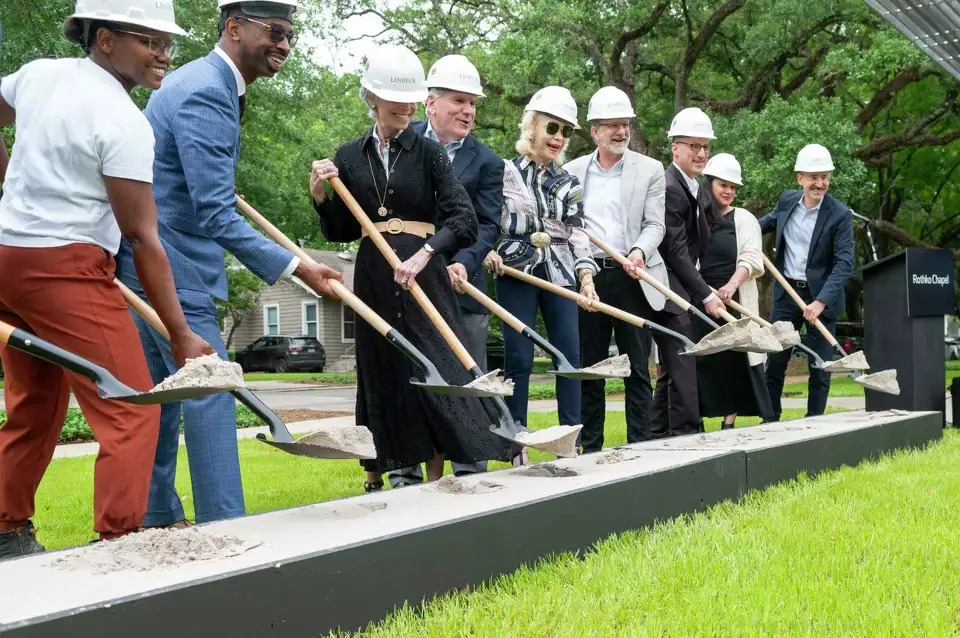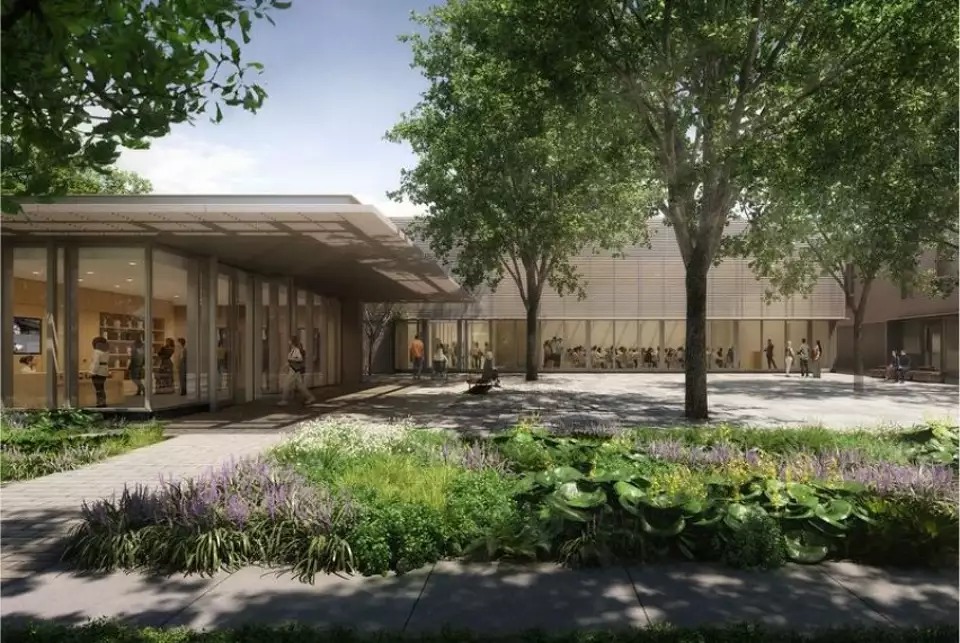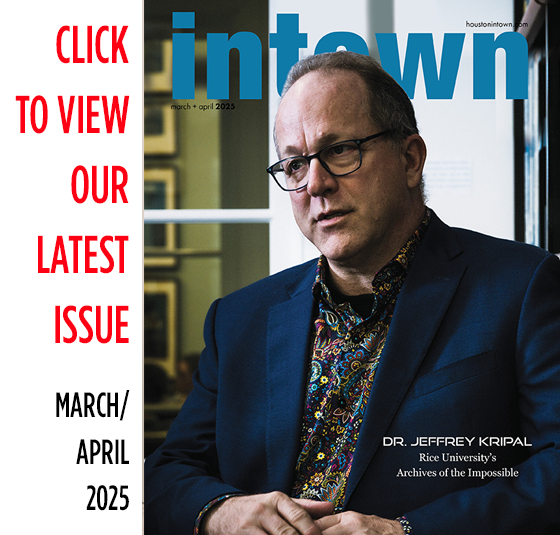
The Rothko Chapel recently broke ground on Phase II of its Opening Spaces campus plan, a $42 million, multi-year restoration and expansion campaign. At the groundbreaking ceremony, the Chapel’s Executive Director, David Leslie, and Opening Spaces Co-Chairman Lee Lahourcade were joined by partners from New York City-based Architecture Research Office (ARO), which designed the campus plan, Nelson Byrd Woltz Landscape Architects (NBW), which is spearheading landscape improvements, and the Linbeck Group, which will oversee the construction. Introducing flexible, multi-use indoor and outdoor spaces for programming, gathering, and reflection, Phase II will support the Chapel’s dual mission as a space of both contemplation and action.
Founded in 1971 by artist Mark Rothko and philanthropists and art collectors John and Dominique de Menil, the Rothko Chapel is among the world’s most celebrated sacred and artistic landmarks. The Chapel – listed on the National Register of Historic Places since 2001 – is defined by its 14 monumental Rothko panels, which invite spiritual reflection and engagement inclusive of diverse spiritual and religious backgrounds. Cherished by art lovers and those seeking moments of stillness, the Chapel welcomes more than 100,000 visitors from more than 100 countries each year and remains one of Houston’s most enduring cultural destinations.
The Opening Spaces campus development project and corresponding capital campaign were initiated in 2016 in anticipation of the Chapel’s 50th anniversary. The project is anchored by a campus plan that focuses on addressing the ever-increasing interest in and visitation to the Chapel. The $42-million project is the most ambitious and transformational capital effort the Chapel has undertaken since its founding.

“The Chapel has never had the room we need to fulfill our dual mission,” Mr. Leslie said. “The Opening Spaces project is not only about creating spaces that enable us to welcome more visitors but also facilitating more enriching experiences of the art, deeper contemplation, and the social justice-focused community engagement embedded in our founders’ vision, which brings people together in dialogue and reflection across the many boundaries that separate us.”
Phase I of the project was started in 2019 and completed in 2021. It involved completely restoring the Chapel building, including a new skylight, lighting and A/V systems, structural reinforcements, and modifications to the entryway and foyer. Phase I also involved major landscape and infrastructure improvements and the construction of the new Suzanne Deal Booth Welcome House. This new campus visitor hub provides both information and orientation for guests.
Phase II is divided into two sub-phases. Phase 2a includes the construction of a new Administration and Archives Building and the Kathleen and Chuck Mullenweg Meditation Garden. Phase 2b will include a new Program Center, a guest bungalow to provide
dedicated housing for Chapel speakers and fellows, and a tree-shaded plaza, all located on the Chapel’s North Campus. When completed in 2026, this expanded the new facilities and redesigned grounds to be more accessible to the public, elevate the visitor experience, and further the founders’ vision of the Chapel as a sanctuary open to all for contemplation and action. Grounded in both the singular power of the Chapel building and the unique character of the surrounding early 20th-century residential neighborhood, the new campus architecture and landscape will maintain the de Menils’ vision of situating the sacred within daily life.
“This project will greatly enhance our campus, creating new outdoor spaces and facilities that will allow us to carry out our important work on behalf of human rights and interfaith dialogue,” said Opening Spaces Co-Chairman Christopher Rothko. “On the heels of our recent 50th anniversary, the work also gives us a welcome opportunity to lift up and celebrate those who have contributed to the design, building, and stewardship of the Rothko Chapel, including the de Menils, Philip Johnson, Howard Barnstone, Gene Aubrey, Barnett Newman, and so many others. All of them shared a vision that brought together modern art and sacred space to promote human unity, solidarity, and justice. This vision is still as relevant today as it was 50 years ago, and I believe it will remain so for generations to come. Herein lies the core reason for Opening Spaces.”
For the first time, the 6,600-square-foot Administration and Archives Building will enable public access to the Chapel’s archives and library, with professional staff support. With a 30-person board room and smaller conference room, the building will also bolster operations and serve as a new home for the Chapel’s administrative team. The new building will support the Chapel as its impact grows and assist staff in preserving the Chapel’s history for generations to come. Clad in carefully detailed gray wood siding to complement the neighboring 1920s bungalows, the new North Campus buildings will also serve to mediate between the surrounding residential Houston neighborhood and the Chapel itself.
Taken together, all the elements of the Opening Spaces project are designed to improve the visitor experience both within the Chapel and throughout the campus and strengthen the Chapel’s ability to engage diverse artistic and spiritual mediums in support of those working on the frontlines of social change movements. The complete project targets LEED v4.0 certification, the Administration and Archives Building targets LEED Silver, and the Program Center targets LEED Gold.
About Rothko Chapel
The Rothko Chapel is a contemplative space that successfully interconnects art, spirituality and compassionate action through a broad array of public programs and community initiatives. It is open to the public every day of the year at no charge. Founded by Houston philanthropists Dominique and John de Menil, the Chapel was dedicated in 1971 as an interfaith, nonsectarian sanctuary and invites visitors from around the world to experience the power and sanctity of Mark Rothko’s monumental paintings. The Rothko Chapel is an independent non-profit organization whose mission is to create opportunities for spiritual growth and dialogue that illuminate our shared humanity and inspire action, leading to a world in which all are treated with dignity and respect.























